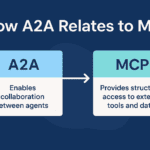In April 2025, Google introduced the Agent2Agent (A2A) Protocol, an open standard designed to revolutionize how AI agents communicate and collaborate — regardless of the platform or vendor they belong to. This protocol is a major leap forward in addressing the long-standing challenge of interoperability in enterprise environments.
Key Features of Google A2A
1. Capability Discovery
AI agents can present their capabilities using standardized “agent cards.” These cards include metadata about each agent’s skills, endpoint URLs, and authentication requirements — making it easier for other agents to identify the right partner for any task.
2. Task Management
A2A focuses communication around the completion of specific tasks. It ensures that agents interact efficiently, securely, and with a clear purpose.
3. Dynamic Collaboration
Agents can share information in real-time, ask for clarifications, and coordinate complex workflows — just like human teams would.
4. User Experience Negotiation
The protocol supports negotiation of UI and content formats (text, audio, video, web forms), enabling smooth cross-platform experiences across different modalities.
Technical Framework
Built using familiar technologies like HTTP, JSON-RPC, and Server-Sent Events (SSE), A2A is easy to implement in modern enterprise IT systems. It’s modality-agnostic and enables secure, flexible communication across a wide variety of platforms.
Applications and Benefits
- Interoperability: A2A enables different vendors’ AI agents to work together out of the box — no custom integrations needed.
- Scalable Automation: Enterprises can deploy teams of specialized agents that collaborate to automate end-to-end workflows.
- Plug-and-Play Extensibility: New agents can be dropped into existing systems with minimal effort, forming dynamic “digital workforces.”
Industry Adoption
Over 50 major tech partners — including Salesforce, Atlassian, SAP, MongoDB, and PayPal — have already backed the protocol. Their support hints at A2A becoming a universal standard for AI interoperability.
A2A vs. MCP: A Complementary Approach
While Anthropic’s Model Context Protocol (MCP) allows individual agents to access external tools and databases, Google’s A2A focuses on inter-agent collaboration. Together, they create a powerful ecosystem for autonomous, intelligent systems.
Conclusion
The Google Agent2Agent (A2A) Protocol is a foundational step toward standardized communication among AI systems. By enabling seamless, secure, and scalable collaboration between agents, A2A is set to unlock the next generation of enterprise automation and intelligent teamwork.
#GoogleA2A #Agent2Agent #AIInteroperability #MultiAgentSystems #EnterpriseAI #DigitalWorkforce #FusionAILabs #AIProtocol #ScalableAutomation #FutureOfAI #AIIntegration #TechInnovation #AIAgents #AIStandards






Leave a comment